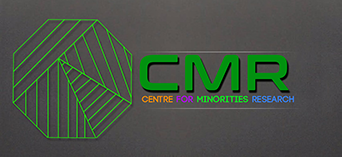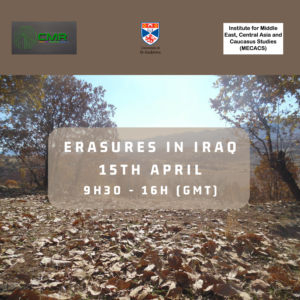Join us at our latest CMR event!
It will be a one-day event that brings together scholars and practitioners to discuss and raise awareness on erasures. The focus will be specifically on Iraqi/Kurdish social groups and themes that deserve attention but remain neglected.
Iraq and the Kurdistan Region of Iraq (KRI) have remained in the public eye for decades. The country has received a huge amount of media and academic attention. In this event, we will focus on certain Iraqi/Kurdish social groups that have been consistently overlooked, and themes that have been ignored by various conflicts, current affairs, and social analyses.
Event Programme
9.30 – 9.35 – Welcome
Sarah Edgcumbe (event organiser and PhD candidate at the University of St Andrews)
9.35 – 9.50 – Event introduction
Saba Azeem (Moderator, PAX for Peace, Iraq)
9.50 – 11.20 – Panel 1: Political-Legal Issues Affecting Minorities in Iraq and the Kurdistan Region of Iraq
Panel Chair & Discussant: Dr Elizabeth Monier (Department of Middle East Studies, University of Cambridge)
| 9.50 – 10.10 | Shivan Fazil | ‘The prevalence and impact of misconceptions and stereotyping of ethnoreligious minorities.’ |
| 10.10 – 10.30 | Dr Muhammad al-Sahar | ‘The Silent Erasure: Synergy of Climate Change and Politics in the Displacement of Sabean-Mandaean of Southern Iraq.’ |
| 10.30 – 10.50 | Dr Maddalena Cogorno | ‘Checkmate to justice! The deadlock to the prosecution of the genocide of the Yazidis.’ |
| 10.50 – 11.00 | Dr Elizabeth Monier | Discussion |
| 11.00 – 11.20 | Dr Elizabeth Monier | Q&A |
11.20 – 11.30 – Break
11.30 – 13.00 – Panel 2: Gypsies and Domari (Roma) in Iraq and the Kurdistan Region of Iraq
Panel Chair & Discussant: Dr Stavroula Pipyrou (School of Social Anthropology and Director of the Centre for Minorities Research, University of St Andrews)
| 11.30 – 11.50 | Dr Mohammed Abd Ali Shafai Al-Sarraji | ‘Social Acceptance Attitudes of Kurdish People Towards the Gypsy “Qarach”.’ |
| 11.50 – 12.10 | Sarah Edgcumbe | ‘Structural Violence as an Obstacle to Peace for Gypsies in Iraq and the KRI.’ |
| 12.10 – 12.30 | Asli Saban | ‘Human Trafficking in Iraq: Domari Victims.’ |
| 12.30 – 12.40 | Dr Stavroula Pipyrou | Discussion |
| 12.40 – 13.00 | Dr Stavroula Pipyrou | Q&A |
13.00 – 13.45 – LunchBreak
13:45 – 15:15 – Panel 3: Ethno-Religious Minorities in Iraq and the Kurdistan Region of Iraq
Panel Chair & Discussant: Dr Fiona McCallum-Guiney (School of International Relations, and Director of the Institute for Middle East, Central Asia, and Caucasus Studies, University of St Andrews)
| 13.45 – 14.05 | Dr Bahar Baser and Dr Duygu Atlas | ‘Transnational Memory and Heritage: Intergenerational Narratives of Kurdistani Jews in Israel.’ |
| 14.05 – 14.25 | Dr Ken Mavor | ‘There’s no place like home? Identities of displaced minority Christians in Iraq, seeking international refuge or facing roadblocks to return.’ |
| 14.25 – 14.45 | Muhtadi Al-Abyadh | ‘Kakaism Between its Mesopotamian Origins and Islamization, an Existential Conflict.’ |
| 14.45 – 15.05 | Professor Hamied al Hashimi | ‘Institutional Role in Constructing Social Identity of the Armenians of Iraq.’ |
| 15.05 – 15.20 | Dr Fiona McCallum- Guiney | Discussion |
| 15.20 – 15.45 | Dr Fiona McCallum- Guiney | Q&A |
15:45 – 16:00 – Moderator round up (Saba Azeem)
Panelists
Shivan Fazil is a senior researcher at the American University of Iraq, Sulaimani’s (AUIS) Institute of Regional and International Studies. Before AUIS, he was a researcher in the SIPRI Middle East and North Africa Programme. His work focuses on governance, peace and conflict dynamics in Iraq. He has extensive experience conducting mixed method research in Iraq, gauging the perceptions of different segments of the population. He frequently provides expert insights to international news outlets about the social, economic, and political conditions in post-conflict Iraq. Fazil holds a MSc in Middle Eastern Politics from the School of Oriental and African Studies (SOAS), University of London as a Chevening Scholar.
Dr Muhammad al-Sahar has been a Professor of Sociology for twenty years. His current position is in the Faculty of Arts at Dhi Qar University in Nasiriyah, Iraq. He gained his PhD in sociology of culture at the College of Arts in the University of Baghdad and has been researching this field since. Dr Al-Sahar has published twenty-five papers in peer-reviewed academic journals, has been the sole author of three books, and has co-authored two more. He has also conducted a number of environmental and social impact assessment studies for oil companies operating in Iraq.
Dr Maddalena Cogorno gained her PhD from the University of Pavia in international criminal law in 2022, and is now a Research Fellow at the University of Florence, Italy. Prior to this, she gained her Master’s degree in Law from the University of Genoa. Dr Cogorno served in the Extraordinary Chambers in the Courts of Cambodia.
Dr Mohammed Abd Ali Shafai Al-Sarraji is an expert on minority affairs and the social status of marginal groups and their demographic distribution in Iraq. He holds a PhD in sociology from the University of Baghdad, where he lectures on education sociology, social theories, and social methodologies. Dr Al-Sarraji also has a wealth of experience performing social research in Iraq for national and international NGOs. He has published a number of articles on Gypsies, Baha’i, and other minorities in Iraq, and has published a book on Iraqi Baha’i. Dr Al Sarraji is currently pursuing a second PhD in cultural anthropology at the University of Granada. He will be presenting part of his doctoral research at this event.
Sarah Edgcumbe (she/her) is a PhD candidate with the School of International Relations at the University of St Andrews. Her research focuses on Gypsy, Roma, and Traveller experiences of conflict and peace in Iraq/KRI and Kosovo. Her research interests include the intersection of conflict, displacement, identity, marginalisation, and resistance as they relate to peacebuilding, with a particular focus on stigmatised groups. Sarah’s masters’ research focused on Iraq’s policy framework for internally displaced persons with special protection needs.
Asli Saban (she/her) obtained her undergraduate degree from Başkent University’s Department of Social Work in 2014 and is currently pursuing her master’s degree in the same department. She has been working in the migration space for over six years now, with an emphasis on refugees and displaced groups in Türkiye, Lebanon, and the Middle East. Her work mainly focuses on social inequality, marginalized groups, migrant and refugee groups, labour rights, child protection and GBV, with a recent focus on the intersections of these areas of focus within the Dom community in the MENA. She is a former member and regional focal point of the United Nations Major Group for Children and Youth’s Migration Working Group.
Dr Bahar Baser is Associate Professor in Middle East Politics at the School of Government and International Affairs, Durham University, UK. Her expertise lies in diaspora studies, peacebuilding, and conflict transformation, with a regional emphasis on the Middle East. Dr. Baser has authored numerous publications on stateless diaspora activism and mobilization in Europe. She is the editor of the Kurdish Studies Series published by Lexington Books and the co-editor of the Diasporas and Transnationalism Series published by Edinburgh University Press.
Dr Duygu Atlas completed her doctoral studies at Tel Aviv University’s School of History in 2019, with her dissertation titled “Turkey’s Jewish Minority between Turkey and Israel from 1948 to the 1990s: Israel’s Impact on a Diaspora Community and Its Identity Formation.” Her research centers on Kurdish and Jewish minorities in Turkey, and more recently, on Kurdistani Jews in Israel. She has extensively published on these subjects. Additionally, Atlas worked as a researcher at the Moshe Dayan Center for Middle Eastern and North African Studies at Tel Aviv University, as well as at the Van Leer Jerusalem Institute, where she also served as the associate editor of the Journal of Levantine Studies. She is the founder of the social media oral history project, Onlyherstory, which captures the life stories of “ordinary” women in Turkey.
Dr Ken Mavor is a senior lecturer in the School of Psychology and Neuroscience at the University of St Andrews. His research focuses on the fluid and complex nature of our personal and social self-categories and identities. This interest covers a range of levels of analysis including the fundamental cognitive processes of categorisation in social perception, phenomena such as attribution, homogeneity, entitativity, self-complexity, the social categorisation of faces and the multi-faceted nature of social identities.
Muhtadi Al-Abyadh (he/his) obtained his undergraduate degree from Al-Qadisiya University’s Department of Sociology in 2012. His undergraduate project examined the use of religious symbols by female beggars. He directly obtained a master’s degree in the same university in 2015. His masters project focused on the rituals of Ashura within the Shia community, exploring the expressions of grief, weeping, and self-flagellation as sacred religious rites. Currently a PhD candidate at the Center for Policy Research (CPR). Universiti Sains Malaysia (USM), he is studying the Shiite community in Iraq’s engagement with political modernity from the 19th century onwards. Throughout his work, he employs “paternalism” and “paternalistic thinking” to characterize Shiite dynamics. Muhtadi also focuses on monotheistic religions through a socio-anthropological perspective. Prior to starting his PhD, he worked as a social researcher at the Ministry of Justice (Prisons) in Iraq. Muhtadi is a member of the National Forum for Research of Thought and Culture, Najaf, Iraq.
Professor Hamied al Hashimi is Professor of Sociology at the International Colleges of Islamic Sciences and Visiting Professor at Al Qadisiya University in Iraq. He obtained his master’s degree at the University of Baghdad, for which he conducted research with Gypsies in two neighbourhoods of the city. He obtained his PhD from the University of Tunis, writing his thesis on ‘The Problematic of Social Integration of Iraqi Immigrants in the Netherlands’. Professor al Hashimi is the author of several books in Arabic and English languages, including the book ‘Gypsies of Iraq: A Socio-anthropological Study’, which has been published in Arabic, and will be published in English in the near future. He is a member of the Charter Institute of Linguists, London, and member of the Royal Anthropological Institute of Great Britain and Ireland.
Panel Chairs/Discussants
Dr Elizabeth Monier is an Assistant Professor of Modern Arabic Studies at the University of Cambridge. She specialises in the modern politics, history and society of the Middle East and has a particular interest in Egypt, Oman, the UAE, Iraq and Kuwait. She has previously held fellowships at Cambridge, the London School of Economics and Political Science, GIGA’s Middle East Institute and the University of Warwick and was a research associate at Darwin College, Cambridge. She holds a PhD in Politics and International Studies from the University of Cambridge and is a member of the Cambridge Interfaith Research Forum.
Dr Stavroula Pipyrou is a Senior Lecturer in Social Anthropology at the University of St Andrews and Founding Director of the Centre for Minorities Research. She has conducted long-term ethnographic research with minorities in Italy since 2006. In her first monograph “The Grecanici of Southern Italy: Governance, Violence, and Minority Politics” (University of Pennsylvania Press, 2016) she presents a theory of “Fearless Governance” – overlapping and sometimes contradictory systems of power, authority, and relational networks that enable the minority to achieve political representation at the intersection of local, national, and global encounters.
Dr Fiona McCallum Guiney is a Senior Lecturer in the School of International Relations at the University of St Andrews and Director of the Institute of Middle East, Central Asia and Caucasus Studies. She works on the political role of Christians in the Middle East including identity, minority rights, church-state-societal relations, Christian-Muslim conflict, interfaith dialogue, migration and the role of the diaspora. From 2013 to 2016, she was the Project Leader on a Humanities in the European Research Area (HERA) collaborative grant entitled “Defining and Identifying Middle Eastern Christian Communities in Europe“.
Moderator
Saba Azeem is a Pakistani national with over thirteen years’ worth of work experience with NGOs such as Oxfam, the Danish Refugee Council (DRC), the Danish Committee for Aid for Afghan Refugees (DACAAR) and World Vision before joining the Protection of Civilians (PoC) team at PAX, where she focuses on human security. Iraq has been her country of focus since January 2017, where apart from working as a humanitarian aid worker, she has also led field research on the reverberating effects of civilian harm in Hawija as a result of a Dutch airstrike, during which she was given the title of Bint-e-Hawija by the Mayor. She leads research on human security in Iraq in Basra, Diyala, Kirkuk and Salahaddin, and has also co-led PAX’s work on PoC with the Office of the National Security Advisor as well as the Prime Minister’s Office, including training and policy development. Saba wrote several chapters in the book ‘On Civilian Harm’, most of them based on her own experiences living in conflict-affected areas. She also contributes to various military trainings, advocating for including meaningful civilian voices in planning and understanding the human environment.


